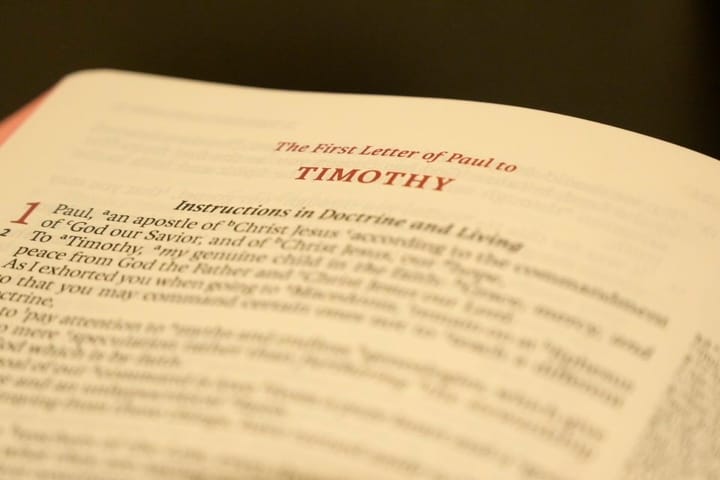Parable of the Shrewd Manager — Luke 16:1–8
In the parable recorded in Luke 16, the dishonest manager was commended for his shrewdness. Let us serve God with fervor and faithfulness.

While Jesus often taught to the multitudes, he shared this parable to his disciples privately.
He also said to the disciples, “There was a rich man who had a manager, and charges were brought to him that this man was wasting his possessions. And he called him and said to him, ‘What is this that I hear about you? Turn in the account of your management, for you can no longer be manager.’ And the manager said to himself, ‘What shall I do, since my master is taking the management away from me? I am not strong enough to dig, and I am ashamed to beg. I have decided what to do, so that when I am removed from management, people may receive me into their houses.’ So, summoning his master’s debtors one by one, he said to the first, ‘How much do you owe my master?’ He said, ‘A hundred measures of oil.’ He said to him, ‘Take your bill, and sit down quickly and write fifty.’ Then he said to another, ‘And how much do you owe?’ He said, ‘A hundred measures of wheat.’ He said to him, ‘Take your bill, and write eighty.’ The master commended the dishonest manager for his shrewdness. For the sons of this world are more shrewd in dealing with their own generation than the sons of light. (Luke 16:1–8 ESV)
Dishonesty of the Shrewd Manager
This manager was a cunning, conniving cheat. He’s an insolent scammer who should have been indicted and incarcerated.
A. He was untrustworthy. (v.1-2)
An anonymous person told the master that his manager was wasting his possessions. The master fired his manager after discovering he was not trustworthy.
B. He was self–centered. (v.3)
The manager was consumed with self–preservation. Anticipating the consequences of his termination, he refused to subject himself to manual labor or begging. He did not care about his master nor anyone else. He cared only for himself.
C. He was Machiavellian. (v.4-7)
He disregarded all principles. He did whatever it took to reach his intended result. He devised a clever scheme and compounded his master’s losses so his personal future remained secured.
Commendation of the Shrewd Manager
This story has an unexpected ending. The story does not end with the mendacious manager’s demise. Instead, the master commended his manager for his shrewdness. This canny manager used every possible means to get what he wanted. Although he was dishonest, he was also resourceful, expedient and astute.
In the parable, the manager was not reprimanded for his abhorrent actions. He got off scot–free.
The modern example of the shrewd manager is today’s politicians. Many politicians are motivated, tactical, and relentless. To them, failure is not an option. They will do whatever it takes to prevail. For selfish gain, they will tell lies, break laws, and backstab people. Most get away without any penalty.
Lessons from the Shrewd Manager
A. Money should be used to extend God’s kingdom.
And I tell you, make friends for yourselves by means of unrighteous wealth, so that when it fails they may receive you into the eternal dwellings. (Luke 16:9)
What was the main point of Jesus’ parable? There was something about the dishonest manager that Jesus wants us to learn. The manager possessed one quality worthy of our emulation.
We need to imitate the manager’s shrewdness. Just as the manager maximized every occasion for selfish gain, we must maximize all our resources (time, talent, money and possessions) for God’s kingdom. We ought to leverage every opportunity for the sake of eternity.
B. Faithfulness is what God desires.
One who is faithful in a very little is also faithful in much, and one who is dishonest in a very little is also dishonest in much. If then you have not been faithful in the unrighteous wealth, who will entrust to you the true riches? And if you have not been faithful in that which is another’s, who will give you that which is your own? (Luke 16:10-12)
Hudson Taylor said, “A little thing is a little thing, but faithfulness in little things is a great thing.”[1]
We deceive ourselves if we think with more money, we would give more. Jesus states that if we are not faithful with little, we will not be faithful with much. Whether we have plenty or little, the goal is identical: faithfulness. God calls us to be faithful.
I thank him who has given me strength, Christ Jesus our Lord, because he judged me faithful, appointing me to his service. (1 Timothy 1:12)
C. You cannot serve God and money.
No servant can serve two masters, for either he will hate the one and love the other, or he will be devoted to the one and despise the other. You cannot serve God and money. (Luke 16:13)
It is impossible to serve another master. With the same tenacity as our politicians, pursue God and his righteousness. Store up treasures in heaven. Don’t pursue money while trying to serve God.
Do not lay up for yourselves treasures on earth, where moth and rust destroy and where thieves break in and steal, but lay up for yourselves treasures in heaven, where neither moth nor rust destroys and where thieves do not break in and steal. For where your treasure is, there your heart will be also. (Matthew 6:19–21)
Application for Today
Don’t be discouraged when you see unscrupulous politicians succeed. Learn from them. Emulate their shrewdness. Imitate their grit. Their success should motivate us to serve God with greater fervor and faithfulness.
A.J. Broomhall. Hudson Taylor and China’s Open Century, Book Four: Survivors’ Pact. London: Hodder and Stoughton and Overseas Missionary Fellowship, 1984, 154. ↩︎




Comments ()